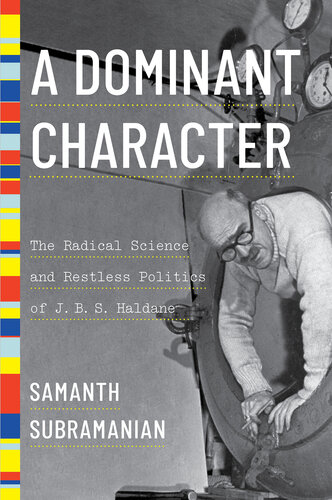
A Dominant Character
The Radical Science and Restless Politics of J. B. S. Haldane
- اطلاعات
- نقد و بررسی
- دیدگاه کاربران
نقد و بررسی

May 1, 2020
A rich biography of a central figure in the 20th-century genetics revolution. British journalist Subramanian begins with a substantial account of the life of his subject's father, J.S. Haldane (1860-1936), a Scottish physiologist who made pioneering discoveries on gases and respiration. His studies included harrowing experiments on himself and his young son, which endangered their lives but stimulated his son's fascination with science. J.B.S. (1892-1964) performed brilliantly at prep school, Eton, and Oxford, with time out to serve in the trenches in World War I, where he also won praise for his bravery. After the war, he returned to academia and turned his attention to population genetics. Subramanian reminds readers that, well into the 20th century, fossils--but little else--supported Darwinian natural selection. That it seemed to operate by blind chance offended many evolutionists, and their alternative theories competed with Darwin's. Haldane's groundbreaking studies described natural selection as a consequence of Mendelian inheritance through mathematical expressions of concepts such as gene frequencies, mutations, recombination, genetic drift, and linkage. Haldane--and two contemporaries, Ronald Fisher and Sewall Wright--established Darwinian natural selection as the central mechanism of evolution, where it remains today. Since his breakthroughs were largely mathematical, he never attained the popularity of figures like Darwin and Mendel, and the author's explanations, though lucid, will not change matters. Haldane became better known as a popular writer and mildly controversial as a communist. He proclaimed his sympathies in the 1930s when it was fashionable but kept them well into later life, when he continued to admire Stalin and shamefully refused to denounce Trofim Lysenko, whose nonsensical theories won over Stalin and destroyed Soviet genetics along with many talented Soviet geneticists. Subramanian delivers a sympathetic account that will interest but frustrate readers who expect geniuses to behave more rationally than others. Haldane deserves to be better known and better understood, and this fine biography succeeds superbly in the first. (12 illustrations)
COPYRIGHT(2020) Kirkus Reviews, ALL RIGHTS RESERVED.

June 1, 2020
Attempting to encompass the entirety of the polymath that was J.B.S. Haldane (1892-1964) is no easy task. Subramanian, an independent journalist, takes on the work admirably in representing how the political and social thought of the Eton- and Oxford-educated classicist was applied to his scientific pursuits in genetics, physiology, and other sciences. Obviously influenced by his father's research for the betterment of safety in Britain's working classes, Haldane's own experiments were applied to preserving life in the trenches and submarines of the wars of the early 20th century (including his own). He believed that Marxist and communist principles were the most practical and rational way to apply science to the betterment of society, refusing to recant publicly, even after it was obvious that Soviet colleagues were suffering under Stalin's regime. A break with communism was followed by a move to the newly independent India, where he again sought to make his research useful to his adopted nation. Krishna Dronamraju's Popularizing Science is the only other modern biography. VERDICT Social historians will appreciate the emphasis on the man and his politics, over an emphasis solely on the science, in this excellent biography.--Wade Lee-Smith, Univ. of Toledo Lib.
Copyright 2020 Library Journal, LLC Used with permission.




دیدگاه کاربران